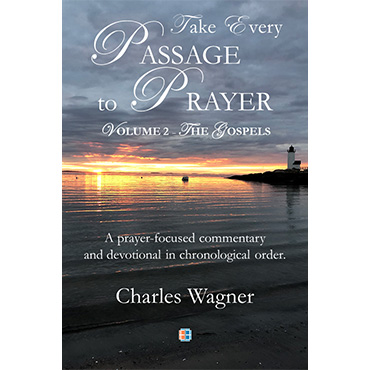The Gramazin Blog

Preaching the Good News and Repentance
Take Every Passage to Prayer - Volume 2, The Gospels
Friday June 14, 2024
Matthew 4:17, Mark 1:14-15
Father, please help me to repent. I don’t want to disobey Your commands anymore. I want my thoughts, words, and actions to please You. Please help me to encourage others to repent, to turn away from their sinful lifestyles. If I fail to communicate that message, many may go to their grave clinging on to their rebellion even as they claim to be believers. Amen.
Father, in the section entitled “John the Baptist Declares Jesus the Messiah”, I concluded that when Jesus was filled with the Holy Spirit at His baptism, He became equipped to preach repentance. The gospels do not record Jesus preaching about repentance prior to His being filled with the Holy Spirit. As we enter into this passage, the gospels have yet to record that Jesus has preached repentance to a large crowd. He has gone into the wilderness, turned water into wine, cleared the temple courts, talked with Nicodemus, interacted with the Samaritan woman, and healed the son of a royal official. It is during His return to the region of Galilee where He begins to preach repentance.
The text tells us that Jesus:
Gave the command to: |
Because: |
Believe the good news |
|
Repent |
Father, what is the “good news” that Jesus told us to believe? The good news is that the long-promised savior has come into the world, and He offers forgiveness of sins and reconciliation with You. His death on the cross, for all who believe in Him, was in fact “near” (about 24-30 months away) at the time He said this. The Kingdom of God was victorious and begun to reign after Jesus’ virgin birth.
Father, the words “repent” and “repentance” are not words people like to hear in 21st century America. However, Jesus often used the word “repent” in his teaching.
- Matthew 4:17 Our text in this passage includes the word.
- Matthew 11:20-21, Luke 10:13 Woe to those who do not repent.
- Matthew 12:41, Luke 11:32 The people of Nineveh repented.
- Matthew 21:32 Tax collectors and prostitutes repented.
- Luke 5:32 Jesus came to call sinners to repentance.
- Luke 13:3-5 Unless you repent, you will perish.
- Luke 15:7-10 There is great rejoicing in heaven when one sinner repents.
- Luke 24:47 Repentance and forgiveness of sins will be taught to all nations.
“Repentance” was a core component of Jesus message. The Greek word for “repent” is ????????. The description of the word in the Blue Letter Bible suggests disgust with one’s sin. A person who repents finds their sin to be repulsive and repugnant, similar to the reaction of a former exotic dancer, who has become a godly woman and a tower of virtue within the Christian community, upon seeing pictures of her “performances” of years ago.
A person who repents is a person who mourns their sin (Matthew 5:4). They grieve that they have disobeyed You. They are disgusted that they ever violated one of Your commands. They want nothing to do with sin anymore in their life. They are humble and contrite (Isaiah 66:2).
The “repentance” that Jesus is preaching is nothing less than the total transformation of people’s hearts. It is the reversal of their morals, values, and priorities. Whereas they loved the road of sin heading to Wickedness the day before, now they turn around on that road and head in the opposite direction to Righteousness.
Father, it is like the man who committed adultery against his wife. He was ashamed of himself and deeply regretted that he was unfaithful. He asked his wife for forgiveness and then led a life of purity from that point forward. He loved his wife and was faithful to her throughout the remaining days of her life. That is repentance.
On the contrary, a remorseless man says to his wife “I’m so sorry. Please forgive me!” but then cheats on her again. He was not sorry for being unfaithful. He didn’t change his morals, values, or priorities. His request for forgiveness was worthless and meaningless, an affront to his wife. He did not repent.
Father, there are many so-called “believers” in our churches today. They have come to the “moment of decision”, asking Jesus into their heart for the forgiveness of their sin. However, there is no change in their morals, values, and priorities. They continue on the road to Wickedness. They love the world and want to be accepted by the world around them. The things of God are boring to them, nothing more than an exercise in religious piety for an hour on Sunday morning. They have no genuine and authentic desire to please God or to live for Him. They find comfort in their belief that because they said “sorry, sorry, sorry, in Jesus’ name” at one point in their life, they have a free pass to do whatever they want and God will “have to” let them into heaven.
However, Luke 13:25-27 is a frightening wake up call for such believers. “But we were Christians, and went to church, and sang songs, and, and, um, we went to Sunday School, and everything.” “I don’t know you. Go away from me.”
A true believer in Jesus Christ repents of their sin for three reasons:
- They are disgusted with their sin.
- They are thankful for forgiveness through Jesus Christ.
- With a grateful heart, they love You and all of Your ways. They desire to please You every moment of every day.
Father, the message of repentance occurs 78 times throughout the Bible (NIV). A few of the passages are:
- He makes them listen to correction and commands them to repent of their evil. (Job 36:10, NIV)
- Therefore, I despise myself and repent in dust and ashes. (Job 42:6, NIV)
- The Redeemer will come to Zion, to those in Jacob who repent of their sins,” declares the Lord. (Isaiah 59:20, NIV)
- I have listened attentively, but they do not say what is right. None of them repent of their wickedness, saying, “What have I done?” Each pursues their own course like a horse charging into battle. (Jeremiah 8:6, NIV)
- Therefore, this is what the Lord says: “If you repent, I will restore you that you may serve me; if you utter worthy, not worthless, words, you will be my spokesman. Let this people turn to you, but you must not turn to them. (Jeremiah 15:19, NIV)
- After I strayed, I repented; after I came to understand, I beat my breast. I was ashamed and humiliated because I bore the disgrace of my youth.’ (Jeremiah 31:19, NIV)
- “Therefore, say to the people of Israel, ‘This is what the Sovereign Lord says: Repent! Turn from your idols and renounce all your detestable practices! (Ezekiel 14:6, NIV)
- “Therefore, you Israelites, I will judge each of you according to your own ways, declares the Sovereign Lord. Repent! Turn away from all your offenses; then sin will not be your downfall. (Ezekiel 18:30, NIV)
- For I take no pleasure in the death of anyone, declares the Sovereign Lord. Repent and live! (Ezekiel 18:32, NIV)
- Produce fruit in keeping with repentance. (Matthew 3:8, NIV)
- Then Jesus began to denounce the towns in which most of his miracles had been performed, because they did not repent. “Woe to you, Chorazin! Woe to you, Bethsaida! For if the miracles that were performed in you had been performed in Tyre and Sidon, they would have repented long ago in sackcloth and ashes. (Matthew 11:20-21, NIV)
- The men of Nineveh will stand up at the judgment with this generation and condemn it; for they repented at the preaching of Jonah, and now something greater than Jonah is here. (Matthew 12:41, NIV)
- I have not come to call the righteous, but sinners to repentance. (Luke 5:32, NIV)
- I tell you, no! But unless you repent, you too will all perish. (Luke 13:5, NIV)
- I tell you that in the same way there will be more rejoicing in heaven over one sinner who repents than over ninety-nine righteous persons who do not need to repent. (Luke 15:7, NIV)
- Peter replied, “Repent and be baptized, every one of you, in the name of Jesus Christ for the forgiveness of your sins. And you will receive the gift of the Holy Spirit. (Acts 2:38, NIV)
- In the past God overlooked such ignorance, but now he commands all people everywhere to repent. (Acts 19:4, NIV)
- I have declared to both Jews and Greeks that they must turn to God in repentance and have faith in our Lord Jesus. (Acts 26:20, NIV)
- Or do you show contempt for the riches of his kindness, forbearance and patience, not realizing that God’s kindness is intended to lead you to repentance? (2 Corinthians 7:2, NIV)
- Yet now I am happy, not because you were made sorry, but because your sorrow led you to repentance. For you became sorrowful as God intended and so were not harmed in any way by us. (2 Corinthians 7:10, NIV)
- Godly sorrow brings repentance that leads to salvation and leaves no regret, but worldly sorrow brings death. (2 Corinthians 12:21, NIV)
- The Lord is not slow in keeping his promise, as some understand slowness. Instead he is patient with you, not wanting anyone to perish, but everyone to come to repentance. (Revelation 2:5, NIV)
- I have given her time to repent of her immorality, but she is unwilling. (Revelation 2:22, NIV)
- Those whom I love I rebuke and discipline. So be earnest and repent. (Revelation 9:20, NIV)
Repentance is about surrendering our lives to Christ.
- Then Jesus said to his disciples, “Whoever wants to be my disciple must deny themselves and take up their cross and follow me. For whoever wants to save their life will lose it, but whoever loses their life for me will find it. What good will it be for someone to gain the whole world, yet forfeit their soul? Or what can anyone give in exchange for their soul? (Matthew 16:24-27, Luke 9:23-24 NIV)
- In the same way, those of you who do not give up everything you have cannot be my disciples. (Luke 14:33, NIV)
- Peter and the other apostles replied: “We must obey God rather than human beings! (Acts 5:29, NIV)
- Therefore, I urge you, brothers and sisters, in view of God’s mercy, to offer your bodies as a living sacrifice, holy and pleasing to Godthis is your true and proper worship. (Romans 12:1, NIV)
- Do you not know that your bodies are temples of the Holy Spirit, who is in you, whom you have received from God? You are not your own; you were bought at a price. Therefore, honor God with your bodies. (I Corinthians 6:19-20, NIV)
- I have been crucified with Christ and I no longer live, but Christ lives in me. The life I now live in the body, I live by faith in the Son of God, who loved me and gave himself for me. (Galatians 2:20, NIV)
- Submit yourselves, then, to God. Resist the devil, and he will flee from you. (James 4:7, NIV)
Father, Your Word teaches us that salvation is by faith alone in Jesus Christ. Works cannot save us. (Ephesians 2:8-10) However, it is our works after our profession of faith in Christ, the works motivated by our repulsion towards living a life of disobedience any further, works motivated by repentance, that reveals whether our coming to faith was authentic, sincere, and genuine. Repentance is another word for bearing fruit (Matthew 3:10, Matthew 7:15-20, Matthew 12:33-37, Luke 3:9, John 15:4-5, Galatians 5:22-23).
It is a lie from the pit of hell that says Jesus never asked us to repent and that He was only about us loving each other. Now that John the Baptist has been imprisoned, Jesus takes over preaching that people must come to faith in Christ and have their hearts transformed by Him so much so that they are eager to obey God’s Word. This is repentance.
Father, Jesus didn’t recommend or suggest that we believe in Him and repent. He commanded us to believe in Him and to repent. Those who will appear before Him on Judgement Day will not be cast into the fire because they made the wrong choice by not believing in Jesus and repenting. They will be sent into the fire because they disobeyed Jesus’ command to believe in Him and repent. Rejecting Jesus as one’s savior is not a catastrophic foolish decision. It is a catastrophic act of rebellion. Amen.







